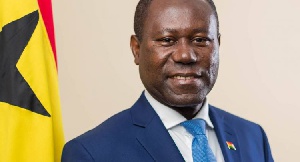 CEO of COCOBOD, Joseph Boahen Aidoo
CEO of COCOBOD, Joseph Boahen Aidoo
Chief Executive Officer of Ghana Cocoa Board (Cocobod), Joseph Boahen Aidoo, has assured lenders that the company is on course to meet its financial obligations in respect of the $1.3billion syndicated loan, in spite of a dwindling crop harvest caused by dry weather and plant disease.
“We have shown over the past 25 years that Cocobod is credible and has never defaulted, and will not default this year,” he told the media.
“I wish to assure lenders that we are on course and will fully meet our financial obligations toward the US$1.3bn we signed for the 2017-18 season. We have sufficient means to meet all our financial obligations for the crop year,” he said.
“We are confident we will meet our collateralised facility as we have always done; we just started paying the first instalment in February and will continue for the next seven months,’’ he said.
While recent rains may improve yields in the smaller harvest that runs from June to September, they may not be sufficient to make up for losses suffered in the main harvest that continues until then, he said.
Last year, Cocobod signed an agreement with some 25 banks to raise a $1.3billion syndicated loan at an interest rate of 0.65% plus Libor rate for the 2017/2018 purchase of cocoa beans.
The Board had purchased 625,111 tonnes of cocoa for the season through Feb. 22, compared with 640,075 tonnes for the same period of the previous crop year.
Mr. Aidoo explained that the Board is in talks with government on ways to pay for operational expenses and liabilities, as the cost of debt on local markets is too expensive.
“We are still discussing with government, and we’ll find some solutions.”
The country is likely to produce around 700,000 tonnes of cocoa this season – well short of its initial forecast of 850,000 tonnes, due to poor rains during the main crop harvest.
The International Cocoa Organisation (ICCO) forecasts a global cocoa surplus of 105,000 tonnes of beans for the 2017/18 season. But concerns about the harvest in neighbouring Ivory Coast, the world’s top producer, has sent global prices soaring in recent weeks.
The country had registered purchases of around 650,000 tonnes by March 2.
Mr. Aidoo said: “We have bought the bulk of our cocoa for the season. We’re hoping to get something from the light crop – about 50,000 tonnes or a little above. That takes us to around 700,000 or a little above 700,000 tonnes”.
The country operates a two-cycle cocoa year consisting of the 33-week main crop (October-June) that is mainly exported to Europe and Asia, and a minor light crop (11-week) which is discounted to local processing firms including the state-owned Cocoa Processing Company (CPC).
Ghana produced an unprecedented one million tonnes of cocoa during the 2010-11 crop-year, thanks to good weather and improved farming techniques – but production declined to about 850,000 tonnes last season.